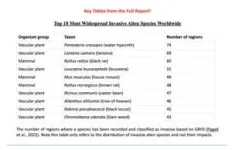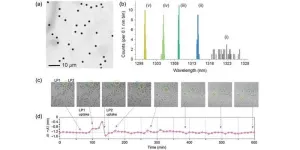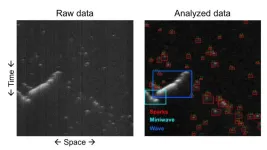(Press-News.org) The Qing Dynasty in China, after over 250 years, crumbled in 1912. Led by the Complexity Science Hub (CSH), an international research team has pinpointed key reasons behind the collapse, revealing parallels to modern instability and offering vital lessons for the future.
China is considered today to be the world's largest economy (in terms of PPP). However, this position is not new. In 1820, China's economy already held the top spot, accounting for 32.9% of the global GDP. In the interim, there was a period of decline followed by a resurgence. In 1912, after over 250 years in power, the Qing Dynasty collapsed despite being considerably wealthier at the time than modern-day China. "This clearly demonstrates that any economy must be vigilant as circumstances can change, and sometimes rather rapidly," emphasizes Georg Orlandi, the study's first author.
SIMILAR ROOTS THEN AND NOW
"It's crucial to comprehend the origins of such instabilities. Assuming it's a thing of the past and can't recur would be a mistake. Such changes can indeed happen because the underlying mechanisms bear surprising similarities," CSH researcher Peter Turchin points out.
Scientists have been attempting to pinpoint the causes behind the fall of the Qing Dynasty for two centuries. Various factors had previously been proposed, including environmental disasters, foreign incursions, famines, or uprisings. However, "none of these factors provides a comprehensive explanation," notes Turchin.
THREE MAIN DRIVERS
Hence, in this study, researchers amalgamated various factors and discovered that three elements dramatically heightened socio-political pressures:
Firstly, there was a fourfold population explosion between 1700 and 1840. This resulted in reduced land per capita and caused an impoverishment of the rural populace.
Secondly, this led to increased competition for elite positions. While the number of contenders soared, the number of awarded highest academic degrees declined, reaching its nadir in 1796. Because such a degree was necessary for obtaining a position in the powerful Chinese bureaucracy, this mismatch between the number of positions and those desiring them created a large pool of disgruntled elite aspirants. The leaders of the Taiping Rebellion, perhaps the bloodiest civil war in human history, were all such failed elite-wannabes.
Thirdly, the state's financial burden escalated due to rising costs associated with suppressing unrest, declining per capita productivity, and mounting trade deficits stemming from depleting silver reserves and opium imports.
Collectively, these factors culminated in a series of uprisings that heralded the end of the Qing Dynasty and exacted a heavy toll in terms of Chinese lives lost.
THE QING WERE AWARE
According to the study's findings, social tensions had already peaked between 1840 and 1890. "Assuming that the Qing rulers were unaware of this mounting pressure would be erroneous," explains Turchin. The fact that the dynasty endured until 1912 rather underscores its institutional structures' robustness.
However, many of their attempted solutions proved short-sighted or inadequate to the task; for instance, the government raised the allowable quota for people passing certain degree exams but without increasing the number of available openings. This ended up exacerbating the already-building tensions. With the arrival of potent geopolitical challengers through the late 19th century, the rulers ultimately couldn't avert their downfall.
PREVENT INSTABILITY TODAY
We can draw valuable lessons from this historical process for the contemporary era and the future. Many nations worldwide are grappling with potential instability and conditions that closely resemble those of the Qing Dynasty. For instance, competition for top positions remains exceedingly fierce. Orlandi cautions, "When a large number of individuals vie for a limited number of positions, political decision-makers should view this as a red flag, as it can, at the very least, lead to heightened instability."
"Unfortunately, the corrosive impact of rising inequality and diminishing opportunities develop over longer time scales that make them hard to recognize,” adds co-author and CSH Affiliated Researcher Daniel Hoyer, “let alone effectively combat within the short political cycles we see in many countries. Without long-term vision and targeted strategies to relieve these social pressures, many places are at risk of going the way of the Qing."
NO CRYSTAL BALLS
"We aren't prophets. Our primary aim is to comprehend social dynamics, which we can then leverage for making forecasts," elucidates Orlandi. The effectiveness of this endeavor using the Structural Demographic Theory (SDT), a method co-developed by Peter Turchin that represents societies as complex interactive systems, has been demonstrated by researchers on multiple occasions. For instance, a study published in 2010 forecasted the 2020 instability in the USA.
___________
FIND OUT MORE
The study “Structural-demographic analysis of the Qing Dynasty (1644–1912) collapse in China” by Georg Orlandi, Daniel Hoyer, Hongjun Zhao, James S. Bennett, Majid Benam, Kathryn Kohn and Peter Turchin was published in PLOS ONE (doi: 10.1371/journal.pone.0289748).
___________
ABOUT THE COMPLEXITY SCIENCE HUB
The mission of the Complexity Science Hub (CSH) is to host, educate, and inspire complex systems scientists dedicated to making sense of Big Data to boost science and society. Scientists at the Complexity Science Hub develop methods for the scientific, quantitative, and predictive understanding of complex systems.
The CSH is a joint initiative of AIT Austrian Institute of Technology, Central European University CEU, Danube University Krems, Graz University of Technology, Medical University of Vienna, TU Wien, VetMedUni Vienna, Vienna University of Economics and Business, and Austrian Economic Chambers (WKO). https://www.csh.ac.at
END
Scientists from Queen Mary University of London have discovered two new genes that cause head and neck cancer patients to be resistant to chemotherapy, and that silencing either gene can make cancer cells previously unresponsive to chemotherapy subsequently respond to it.
The two genes discovered actively ‘work’ in most human cancer types, meaning the findings could potentially extend to other cancers with elevated levels of the genes.
The researchers also looked through a chemical library, commonly used for drug discovery, and found two substances that could target the two genes specifically and make resistant cancer cells almost 30 times more sensitive to ...
Digital information exchange can be safer, cheaper and more environmentally friendly with the help of a new type of random number generator for encryption developed at Linköping University, Sweden. The researchers behind the study believe that the new technology paves the way for a new type of quantum communication.
In an increasingly connected world, cybersecurity is becoming increasingly important to protect not just the individual, but also, for example, national infrastructure and banking systems. And there is an ongoing race between hackers and those trying to protect information. The most common way ...
People living with lung conditions, such as asthma and chronic obstructive pulmonary disease (COPD), face even greater risks from climate change, according to an expert report published today (Monday) in the European Respiratory Journal [1].
The report brings together evidence on how the effects of climate change, such as heatwaves, wildfires and flooding, will exacerbate breathing difficulties for millions of people around the world, particularly babies, young children and the elderly.
On behalf of the European Respiratory Society, which represents more than 30,000 lung specialists from 160 countries, the authors ...
ChatGPT could help to increase vaccine uptake by debunking myths around jab safety, say the authors of a study published in the peer-reviewed journal Human Vaccines and Immunotherapeutics.
The researchers asked the artificial intelligence (AI) chatbot the top 50 most frequently-asked Covid-19 vaccine questions. They included queries based on myths and fake stories such as the vaccine causing Long Covid.
Results show that ChatGPT scored nine out of 10 on average for accuracy. The rest of the time it was correct but left some gaps in the information provided, according to the study.
Based on these findings, experts who led the study from the GenPoB research group based ...
Humans, like many other species, regulate protein intake more strongly than any other dietary component and so if protein is diluted there is a compensatory increase in food intake. The hypothesis proposes that the dilution of protein in modern-day diets by fat and carbohydrate-rich processed foods is driving increased energy intake as the body seeks to satisfy its natural protein drive - eating unnecessary calories until it does so.
This paper, resulting from the Royal Society Discussion Meeting held in London last October, shows that observational, experimental and mechanistic research increasingly supports ...
For roughly 80% of breast cancer survivors, treatment doesn’t end with surgery, radiation and chemotherapy. Instead, for the next five to 10 years, doctors recommend that they take medication to block sex hormones, which can fuel tumor growth and spark recurrence.
The drugs are life-saving: They’ve been shown to cut risk of cancer recurrence by as much as half in patients with hormone receptor-positive tumors (HR+)—the most common form of breast cancer. Yet despite their promised benefits, 40% of patients stop taking them early and a third ...
Micro- and nanodisk lasers have recently emerged as promising optical sources and probes for various applications in the fields of nanophotonics and biomedicine. Their ability to achieve lasing at a deterministic wavelength and ultra-narrowband precision is critical for several applications in on-chip photonic communications, on-chip bioimaging, biochemical sensing, and quantum photonic information processing. However, the large-scale fabrication of such precise wavelength micro- and nanodisk lasers remains challenging. Current nanofabrication processes introduce randomness in ...
For more than 30 years, the models that researchers and government agencies use to forecast earthquake aftershocks have remained largely unchanged. While these older models work well with limited data, they struggle with the huge seismology datasets that are now available.
To address this limitation, a team of researchers at the University of California, Santa Cruz and the Technical University of Munich created a new model that uses deep learning to forecast aftershocks: the Recurrent Earthquake foreCAST (RECAST). In a paper published today in Geophysical Research Letters, the scientists show how the deep learning model is more flexible ...
(SACRAMENTO, Calif.) — A team of UC Davis and University of Oxford researchers have developed an innovative tool: SparkMaster 2. The open-source software allows scientists to analyze normal and abnormal calcium signals in cells automatically.
Calcium is a key signaling molecule in all cells, including muscles like the heart. The new software enables the automatic analysis of distinct patterns of calcium release in cells. This includes calcium "sparks," microscopic releases of calcium within cardiac cells associated ...
Key takeaways
Ants can either forage for food as individuals or recruit other members of their colonies to help search for or carry food back to their nests.
UCLA biologists found that the strategies ants use to forage play a bigger role in how they build their nests than innate, evolutionary “blueprints” do.
When building nests, ants strike a balance between transportation efficiency and architectural constraints. Researchers say that observation could help humans design more efficient transportation systems tailored to specific needs.
Could ants’ nests hold the secret to reducing traffic congestion on the 405 Freeway?
In a new study, UCLA biologists ...






